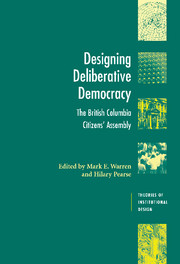Book contents
- Frontmatter
- Contents
- List of Tables
- List of Figures
- Contributors
- Preface
- Introduction: democratic renewal and deliberative democracy
- 1 Who should govern who governs? The role of citizens in reforming the electoral system
- 2 Citizen representatives
- 3 Institutional design and citizen deliberation
- 4 Agenda-setting in deliberative forums: expert influence and citizen autonomy in the British Columbia Citizens' Assembly
- 5 Descriptive representation in the British Columbia Citizens' Assembly
- 6 Do citizens' assemblies make reasoned choices?
- 7 Communicative rationality in the Citizens' Assembly and referendum processes
- 8 Deliberation, information, and trust: the British Columbia Citizens' Assembly as agenda setter
- Conclusion: the Citizens' Assembly model
- References
- Index
4 - Agenda-setting in deliberative forums: expert influence and citizen autonomy in the British Columbia Citizens' Assembly
Published online by Cambridge University Press: 22 September 2009
- Frontmatter
- Contents
- List of Tables
- List of Figures
- Contributors
- Preface
- Introduction: democratic renewal and deliberative democracy
- 1 Who should govern who governs? The role of citizens in reforming the electoral system
- 2 Citizen representatives
- 3 Institutional design and citizen deliberation
- 4 Agenda-setting in deliberative forums: expert influence and citizen autonomy in the British Columbia Citizens' Assembly
- 5 Descriptive representation in the British Columbia Citizens' Assembly
- 6 Do citizens' assemblies make reasoned choices?
- 7 Communicative rationality in the Citizens' Assembly and referendum processes
- 8 Deliberation, information, and trust: the British Columbia Citizens' Assembly as agenda setter
- Conclusion: the Citizens' Assembly model
- References
- Index
Summary
Social scientists have long recognized that those who control the agenda can control the outcome of a discussion. Research has shown that agenda-setting processes shape political decisions in at least three distinct ways. First, political agenda-setting processes may consistently exclude certain problems from discussion (Bachrach and Baratz 1962, 1963; Lukes 1974). While putting limits on a discussion should not be assumed to be inherently politically biased (Wright, Levine, and Sober 1992), empirical research has shown a political bias operating in particular cases (e.g. Crenson 1971; Gaventa 1980). Second, the substantive choices identified within a discussion may exclude important courses of action. For example, participatory budgeting processes may require that citizens redress fiscal imbalance through budget cuts, instead of raising taxes. (See for example two different participatory budgeting processes described in Weeks (2000) and Jones (2004)). Third, the overall structure of a decision-making process may bias an outcome. Different processes for aggregating preferences may yield outcomes that do not reflect the true distribution of preferences of the group. For example, empirical research has shown that consensus methods of decision-making may suppress important substantive conflicts (Rothschild-Whitt 1979; Snyder 2003), and may result in more polarized or extreme outcomes (Miller 1985; Moscovici and Zavalloni 1969) than individual group members' preferences might suggest. Conversely, as will be discussed below, plurality-based decisions also exclude the accommodation of some preferences in a decision-making process.
- Type
- Chapter
- Information
- Designing Deliberative DemocracyThe British Columbia Citizens' Assembly, pp. 85 - 105Publisher: Cambridge University PressPrint publication year: 2008
- 15
- Cited by



